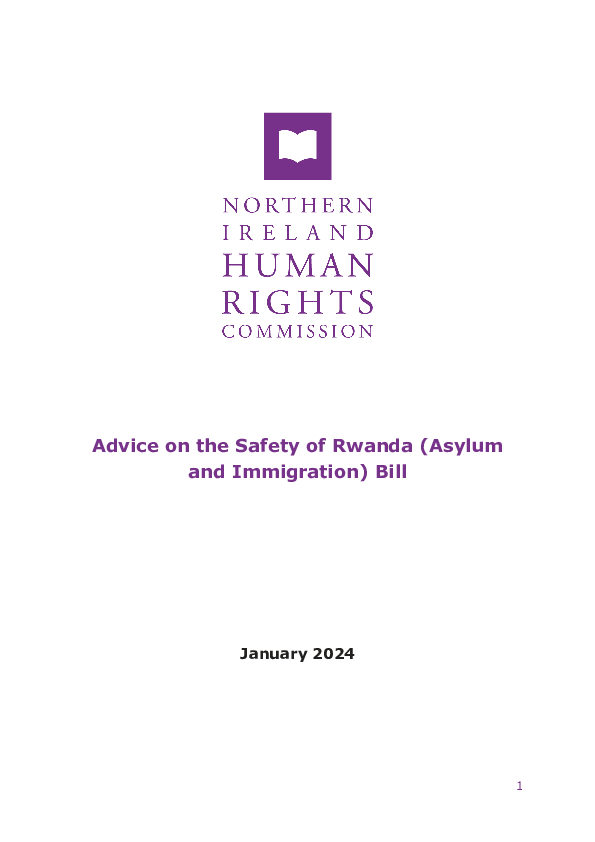NIHRC Advice on the Safety of Rwanda (Asylum and Immigration) Bill
Date produced: January 2024.
Below is a summary of the Commission's recommendations and messages.
You can also download the full document through the links provided.
The NI Human Rights Commission advises and recommends:
2.5 advises that the Bill requires immediate and thorough reassessment.
3.15 advises that refugees and asylum seekers are protected by Article 2 of the Windsor Framework.
3.16 advises that rights particular to refugees and asylum-seekers are within the scope of the Rights, Safeguards and Equality of Opportunity chapter of the Belfast (Good Friday) Agreement by virtue, in particular, of the commitment to civil rights and to incorporate the ECHR into domestic law.
3.17 advises that, as a result of Windsor Framework Article 2, the following measures of EU law, which were binding on the UK before EU withdrawal, continue to set standards for human rights protection below which the law in NI should not fall:
4.8 suggests that the current relationship between the UK courts, UK Parliament and international law is balanced. The NIHRC advises that this Bill will create an imbalance. It will, deliberately, abdicate responsibility under the 1951 Refugee Convention, threaten the international refugee protection regime and risk the erosion of the UK’s standing and ability to collaborate in the multilateral system.
5.11 advises that the safety or otherwise of Rwanda cannot be pre-emptively and/or collectively determined. The lawfulness and appropriateness of a person’s removal to Rwanda must be assessed individually and be subject to procedural safeguards, prior to removal.
5.12 advises that clause 2 may be in breach of Windsor Framework Article 2 by diminishing rights previously protected by the EU Procedures Directive (which bound the UK prior to EU Withdrawal), particularly in relation to Article 27 (the safe third country concept) and Article 8 (requirements for the consideration of applications).
5.21 advises that the very limited exceptions provided for in clause 4 of the Bill do not provide adequate safeguards that mitigate the risk of refoulement and ensure compliance with Articles 2 and 3 ECHR. In addition, if enacted, clauses 2 and 4 would contravene the UK’s international obligations under ICCPR, UN CAT and the 1951 Refugee Convention.
5.22 advises that clauses 2 and 4 may be in breach of Windsor Framework Article 2 by diminishing rights previously protected by the EU Procedures Directive Article 27 (the safe third country concept) in respect of protection against refoulement.
5.26 advises that parliamentary sovereignty and the separation of powers go hand-in-hand. This is not the case in the present Bill, particularly within clause 2.
5.28 advises that the restriction in the operation of and access to courts and tribunals, in clause 2, may amount to a breach of Windsor Framework Article 2 by diminishing rights previously protected by Article 39 of the EU Procedures Directive and Article 47 of the EU Charter.
5.33 advises that to the extent that clause 2(5) limits the ability of an individual to seek redress for a potential diminution of Windsor Framework Article 2, it is in breach of Article 4 of the UK-EU Withdrawal Agreement.
6.7 advises that disapplying the interpretative and remedial provisions of the Human Rights Act 1998 while dismantling the guarantees enshrined in ECHR Articles 2 and 3 does not ensure the right to an effective remedy under ECHR Article 13.
6.9 advises that the balanced relationship between the UK courts, ECtHR and UK Parliament will be upset by this approach and one consequence includes the weakening of protection afforded to individuals seeking asylum in the UK.
7.10 advises that the restrictions placed on the consideration of an individual’s circumstances under clause 4 of the Bill renders the domestic remedies ineffectual and, in the case of those who face a risk of refoulement, unavailable.
7.16 advises that narrow grounds of challenge and a high evidential threshold for those grounds may diminish the rights of asylum-seekers which were previously protected by EU Procedures Directive Article 27 (the safe third country concept), which is likely to be contrary to Windsor Framework Article 2.
7.18 advises that clause 4(2) may diminish a right to an effective remedy under Article 47 of the Charter of Fundamental Rights of the EU, in relation to minimum standards set out in Article 27(1)(b) of the EU Procedures Directive and Article 21 of the EU Qualification Directive.
8.2 advises that compliance with interim measures is an essential requirement of membership of the Council of Europe.
9.6 advises that the present Bill does not consider the Belfast (Good Friday) Agreement, and the integral role of both the Human Rights Act and ECHR in the complex fabric of the NI Peace Process and devolution. The NIHRC is particularly concerned that the present Bill appears to be incompatible with obligations under the Belfast (Good Friday) Agreement to incorporate the ECHR and provide direct access to the courts.

Download Documents
Your browser is out-of-date!
Update your browser to view this website correctly. Update my browser now